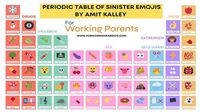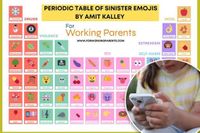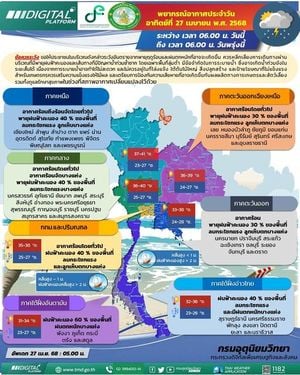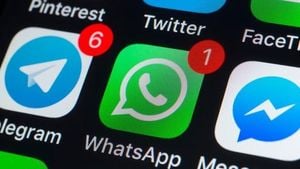A picture — or an emoji — tells a thousand words. Amit Kalley, the founder of the organization For Working Parents, has issued an urgent warning to parents about the secret meanings of smartphone emojis that could be used by children to convey “sinister” messages. “The unregulated internet can be very dangerous for our children,” Kalley wrote on Instagram. “This issue is too big to ignore and the Netflix series, ‘Adolescence,’ has brought it to mainstream attention.”
He referenced the hit streaming show “Adolescence,” which debuted earlier this month and follows the story of a teen boy — who uses secretive emojis — who is arrested for murdering his female classmate. According to Kalley’s “periodic table of emojis,” there are double meanings to seemingly innocent emojis that could be used by teens to send secretive messages. Cocaine can be denoted by a snowflake, 8-ball or snowman, while marijuana can be symbolized by a tree, leaf or branch. MDMA is represented by the bill emoticon, while ketamine is denoted by a horse and magic mushrooms by the red mushroom emoji.
When it comes to NSFW emojis, “lust” can be symbolized with the flame, sweating or devil emojis, while “oral sex” is represented by the brain or tongue symbols. Certain genitalia, depending on sex, is denoted by eggplants, hot dogs, cherries or the peach icon, while anal sex can be communicated using the donut emoji. While some meanings may seem like a given — the gun or knife emojis symbolize weapons and the smiley face with x’s over the eyes represents death or murder — others might need further explaining. “Incel” can be denoted with the apple, bean, bill or “100” emoticons, while “Neo-Nazi” is symbolized with the hedgehog, lightning bolt or the numbers 1488. In addition, “anti-woman” can be communicated with the ghost or the goblin and monster emojis. “It’s far from an exhaustive list, but it’s based on common emojis used to say something very different to what you’d think,” Kalley wrote.
Kalley’s table has gone viral and been adopted by local schools and police forces in the UK, according to The Telegraph, and one college urged people to educate themselves on the “dark emojis” that “every parent should know” following the success of the Netflix show. “The table I created is far from an exhaustive list, but I wanted to include emojis beyond incel and misogyny, because lots of young people are groomed online into drugs and violence and lots of young people are involved in dangerous sexual behaviors, which they can hide from parents by using emojis and acronyms,” Kalley told The Telegraph. “Emojis and acronyms change, so parents have to keep researching and keep asking the right questions. We need to normalize conversations about the online world with our children.”
Following the success of the Netflix hit “Adolescence,” police and schools have issued warnings about a 'sinister emoji' code used by incel teenagers. The series, which has become the UK's most-watched streaming programme, shows school children using emojis to spread hidden messages about misogyny and radicalization. The show follows 13-year-old Jamie Miller, played by Owen Cooper, who is arrested for the murder of a female classmate. In one shocking scene, we see just how far out of their depth the series' adults are, as DI Luke Bascome's son explains the sinister meaning behind common emojis.
Merseyside Police have already circulated the emoji table to schools and parents, according to the Liverpool Echo. The 'emoji code', produced by education charity For Working Parents, exposes 60 seemingly innocent symbols being used to hide disturbing messages about drugs, violence, sex, self-harm, extremism, and incels, meaning involuntary celibates. These include the OK hand gesture, said to be linked to the far-Right, a dragon emoji representing heroin and a hedgehog emoji, which signifies neo-Nazi.
Other emojis are a pill emoji, used to indicate incel culture, a ghost emoji meaning anti-woman and a devil emoji for lust. A donut is said to mean anal sex, a pair of scissors is linked to self-harm while a horse means ketamine. The charity, which promotes 'inclusive communities', says schools across the South West, London, the Midlands, and the North of England are now warning parents about the 'sinister' code. South Wirral High School in Cheshire said it was sharing the table with parents and cautioned that 'emojis aren't always as innocent as they seem'.
While Hailsham Community College in East Sussex has told parents that “Adolescence” had shone a light on how emojis can, in some instances, be used as a coded language with a more sinister meaning. Amit Kalley, founder of For Working Parents, urged mothers and fathers to 'keep researching and asking the right questions' about their children's digital lives. He told the Telegraph: 'The table I created is far from an exhaustive list, but I wanted to include emojis beyond incel and misogyny, because lots of young people are groomed online into drugs and violence and lots of young people are involved in dangerous sexual behaviors, which they can hide from parents by using emojis and acronyms.'
Councillor Simon Minas-Bound, of Basingstoke and Deane Borough Council, backed the initiative, saying it helps parents 'understand what your child might really be saying' in online conversations. However, Mike Buchanan, of Justice for Men & Boys, labelled it as 'moral panic' and argued that crimes by boys and young men 'are not being caused by emojis', accusing the media of 'gynocentrism' in focusing solely on the dangers posed to girls.
“Adolescence” continues to dominate headlines, with figures published by ratings body BARB showing that the first episode was watched by 6.45 million people in its first week. Labour leader Sir Keir Starmer has praised the show, while writer Jack Thorne has called for it to be shown in schools nationwide. The Prime Minister said on Monday: 'There's a reason why the debate has suddenly sparked into life. A lot of people who work with young people at school or elsewhere recognize that we may have a problem with boys and young men that we need to address.'
This is not the first time police have sounded the alarm over secret digital codes. In December 2022, Surrey Police warned of a 'secret world of emojis' linked to drugs and sex, while earlier this month, Nottinghamshire Police issued a list of 52 acronyms and hashtags allegedly used by teenagers to discuss mental health, drugs, and sex. The emergence of this emoji code reflects a growing concern about the digital lives of young people and the potential dangers they face online.






